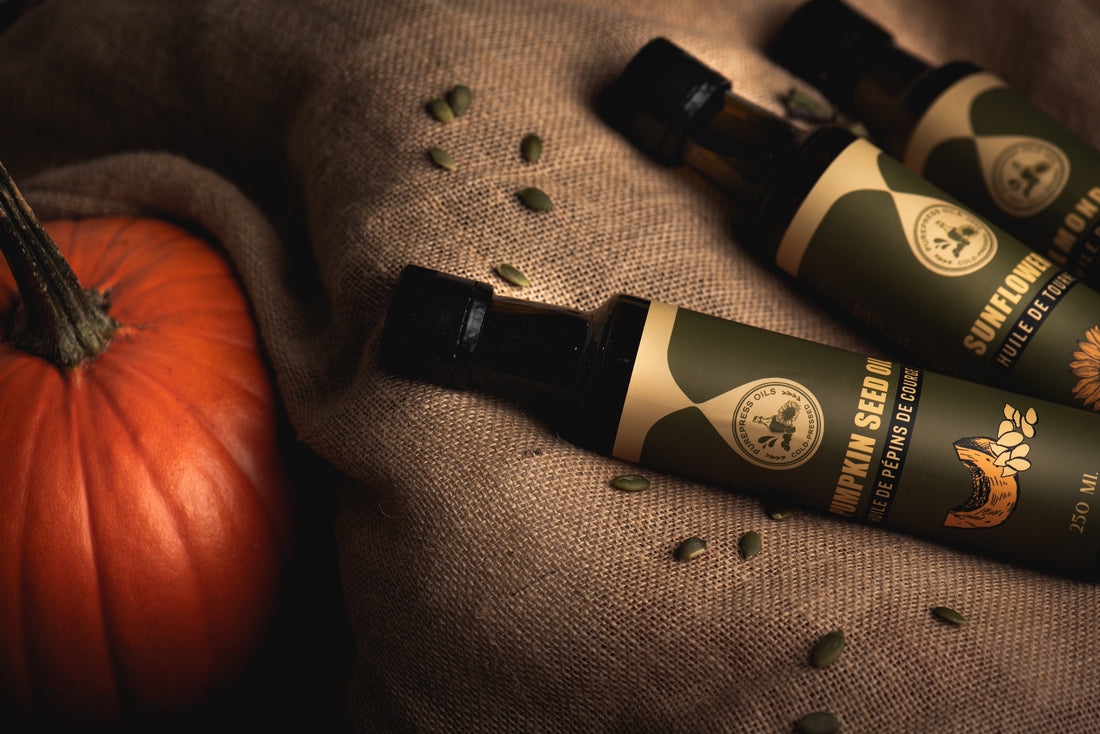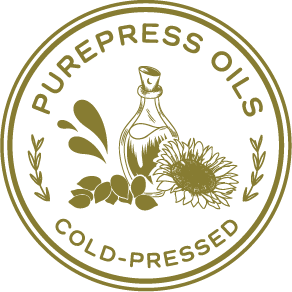
Cold-Pressed vs. Refined Oils: Understanding the Differences and Benefits
Olesya OdasShare
When you stroll down the oil aisle of your local grocery store, you’re met with an overwhelming array of options—sunflower, olive, almond, pumpkin seed, coconut—the list seems endless. But there’s more to these oils than meets the eye, particularly when it comes to how they’re made. The terms "cold-pressed" and "refined" might sound like industry jargon, but they tell you a lot about how the oil was extracted, its nutritional quality, and its flavor profile.
At Purepress Oils, a small family-owned mill, we specialize in cold-pressed oils, lovingly made in small batches from premium seeds and nuts, including pumpkin seeds, almonds, and sunflowers. In this article, we’ll explore the key differences between cold-pressed and refined oils, the benefits of each, and how to choose the best oil for your lifestyle.
What Does “Cold-Pressed” Mean?
The term "cold-pressed" refers to the method by which the oil is extracted from seeds or nuts. Cold-pressing is a mechanical process where the raw materials are crushed and pressed to release their oil, without the use of heat. The idea is simple: by avoiding heat, the oil retains more of its natural flavor and nutrients.
How Cold-Pressed Oil Is Made
- Raw Material Selection: Only high-quality seeds or nuts are chosen. For example, Purepress Oils uses carefully sourced organic pumpkin seeds, almonds, and sunflower seeds.
- Mechanical Pressing: Using mechanical presses, the seeds or nuts are pressed to extract their oil. No or little heat is applied during this process—hence the term “cold” pressed.
- Filtration: After pressing, the oil is filtered only to remove any remaining large solid particles. What’s left is pure, unrefined oil.
By keeping the extraction process simple and avoiding too much heat, cold-pressed oils preserve many of the natural nutrients found in the raw seeds or nuts.
What Is a Refined Oil?
In contrast to cold-pressed oils, refined oils undergo a more intensive process. They are extracted using high heat or chemical solvents, followed by a series of refining steps that can include bleaching, deodorizing, and sometimes even hydrogenation (the process of turning liquid oil into solid fat). While these oils tend to have a longer shelf life and a neutral flavor, they often lose some of their nutritional value in the process.
How Refined Oil Is Made
- Pressing or Solvent Extraction: The oil is extracted from the seeds or nuts using either a mechanical process or chemical solvents. The latter increases the yield but can leave behind trace residues.
- Degumming and Neutralizing: The oil is treated with water or acid to remove impurities, including phospholipids and free fatty acids.
- Bleaching: In this step, the oil is treated with bleaching clay to remove pigments and improve its color.
- Deodorizing: Steam distillation is used to remove odors, resulting in a neutral-smelling oil.
- Hydrogenation (Optional): Some refined oils are hydrogenated to improve shelf life and stability, particularly for use in processed foods. This process also produces trans fats, which are known to be unhealthy.
Nutritional Comparison: Cold-Pressed vs. Refined Oils
One of the most important factors when choosing an oil is its nutritional value. Because cold-pressed oils are minimally processed, they retain more of their original nutrients compared to refined oils.
Nutrients in Cold-Pressed Oils
- Vitamins: Cold-pressed oils tend to be rich in heat-sensitive vitamins like vitamin E, which acts as a powerful antioxidant. Almond oil, for example, is an excellent source of vitamin E.
- Polyphenols and Phytosterols: Pumpkin seed oil and sunflower oil are packed with these compounds, which are naturally occurring antioxidants that support general wellness.
- Essential Fatty Acids: Cold-pressed oils often contain a higher concentration of essential fatty acids like omega-6 and omega-9, which play important roles in cellular health and skin barrier function.
Nutrients in Refined Oils
During the refining process, many nutrients are lost. High temperatures and chemical treatments can destroy vitamins, antioxidants, and beneficial fats. For example, vitamin E is particularly sensitive to heat and can be significantly reduced during the refining process. Research published in the Journal of Food Science and Technology showed that refining oils can reduce vitamin E content by up to 50% (Palanisamy et al., 2019).
However, refined oils have their place. They’re typically more stable for cooking at high temperatures due to their higher smoke points. This makes them ideal for deep frying or high-heat baking, where cold-pressed oils might break down and lose their integrity.
Flavor and Aroma: Why Cold-Pressed Wins
If you’ve ever tasted a cold-pressed oil, you know that it’s bursting with flavor. Cold-pressed oils maintain the natural taste and aroma of the seeds or nuts from which they’re extracted, because the process doesn’t involve heat or chemicals that can strip away flavor.
Pumpkin Seed Oil
Pumpkin seed oil is rich, nutty, and deep green in color. It has a bold flavor that can enhance everything from salads to soups. It’s also delicious drizzled over roasted vegetables or even added to ice cream for an unexpected twist.
Almond Oil
Almond oil has a lightly sweet, nutty flavor. Its delicate aroma makes it a popular choice in baking and salad dressings, where it can add a subtle richness without overpowering the other ingredients.
Sunflower Oil
Cold-pressed sunflower oil has a mild, nutty flavor, making it a versatile choice for a range of dishes. Its light texture and neutral taste allow it to shine in both savory and sweet applications.
Refined Oils: A Neutral Palate
Refined oils, by contrast, are almost entirely neutral in flavor and aroma. While this can be useful for certain cooking applications, such as frying, where you don’t want the oil to affect the taste of your food, you’re also missing out on the complex flavors that cold-pressed oils offer.
Smoke Point: Cooking with Cold-Pressed and Refined Oils
One of the most practical considerations when choosing an oil is its smoke point—the temperature at which the oil begins to break down and produce harmful compounds. The smoke point varies between cold-pressed and refined oils.
Cold-Pressed Oils: Lower Smoke Point
Cold-pressed oils generally have lower smoke points than refined oils, which makes them best for low- to medium-heat cooking.
- Pumpkin Seed Oil: With a smoke point of about 160°C (320°F), pumpkin seed oil is best used as a finishing oil or for light sautéing.
- Almond Oil: Almond oil has a slightly higher smoke point at around 220°C (428°F), making it suitable for sautéing or roasting at moderate temperatures.
- Sunflower Oil: Cold-pressed sunflower oil can handle medium-heat cooking with a smoke point of about 107°C (225°F), but it shines best in salad dressings or drizzled over finished dishes.
Refined Oils: Higher Smoke Point
Refined oils, due to their processing, can handle much higher temperatures without breaking down. This makes them more suitable for deep frying, stir-frying, and high-heat baking. For example, refined sunflower oil has a smoke point of 232°C (450°F), which is ideal for frying.
Why Choose Cold-Pressed Oils?
At Purepress Oils, we believe in the power of cold-pressed oils for a variety of reasons, and our customers seem to agree! Here’s why you might consider adding cold-pressed oils to your pantry.
1. Retains Nutrients
The cold-pressing process preserves many of the natural nutrients found in seeds and nuts, including antioxidants, vitamins, and healthy fats. These nutrients are often lost during the refining process due to exposure to heat and chemicals.
2. Rich in Flavor
Cold-pressed oils offer rich, complex flavors that can elevate your cooking. Whether you're drizzling pumpkin seed oil over a fresh salad or baking with almond oil, the taste is hard to beat.
3. Minimally Processed
Cold-pressed oils are made without the use of harsh chemicals or excessive heat, making them a more natural choice. At Purepress Oils, we take pride in our traditional, small-batch approach to oil production, which emphasizes quality over quantity.
4. Versatility
Cold-pressed oils are versatile and can be used in a variety of dishes—from salads to desserts. They also make excellent finishing oils, adding a burst of flavor and a touch of elegance to any meal.
Why Choose Refined Oils?
Refined oils, though less nutritious, still have their place in the kitchen. They’re ideal for high-heat cooking, and their neutral flavor allows them to blend seamlessly into dishes without competing with other flavors.
1. High Smoke Point
Refined oils are the go-to for frying and sautéing at high temperatures. Their stability under heat makes them perfect for stir-frying, deep-frying, and high-heat roasting.
2. Longer Shelf Life
Due to the refining process, these oils are less likely to oxidize and go rancid, which gives them a longer shelf life compared to cold-pressed oils.
3. Neutral Flavor
When you don’t want the flavor of the oil to stand out, refined oils provide a blank slate for your cooking. This is especially useful in dishes where you want the other ingredients to shine.
Sustainability and Tradition: The Purepress Oils Difference
At Purepress Oils, we don’t just care about what’s in the bottle—we care about how it gets there. As a small, family-owned business, we use traditional methods to produce our cold-pressed oils, ensuring that every bottle is of the highest quality. Our commitment to sustainability extends beyond our products; we believe in supporting small-scale agriculture and minimizing waste throughout the production process.
Choosing cold-pressed oils from a small mill like Purepress Oils means supporting ethical production practices that prioritize quality, flavor, and environmental responsibility.
Conclusion: Cold-Pressed vs. Refined Oils—Which Is Right for You?
Ultimately, whether you choose cold-pressed or refined oils depends on your needs in the kitchen. If you’re looking for oils that are rich in flavor, high in nutrients, and minimally processed, cold-pressed oils like those produced by Purepress Oils are a fantastic option. They’re perfect for adding depth and character to your dishes while also offering a range of nutritional benefits.
On the other hand, refined oils have their place in high-heat cooking and can be a practical choice for frying or baking. However, they don’t offer the same nutritional punch or flavor complexity as cold-pressed oils.
At Purepress Oils, we’re passionate about sharing the unique qualities of cold-pressed pumpkin seed oil, almond oil, and sunflower oil with you. We invite you to explore the rich flavors and natural goodness that only cold-pressed oils can provide, and we’re here to help you make informed choices about the oils you use in your kitchen.
References:
- Palanisamy, K., Pradeep, S., & Madhava, N. V. (2019). "Impact of Refining on the Nutritional Content of Edible Oils." Journal of Food Science and Technology.
- Górnaś, P., & Siger, A. (2017). "Cold-Pressed and Refined Vegetable Oils: A Nutritional Comparison." European Journal of Lipid Science and Technology.
- American Heart Association (AHA). (2022). "Fats and Oils: What You Should Know."
- Szydłowska-Czerniak, A., Łaszewska, A., & Frankowska, A. (2015). "The Effect of Cold-Pressing and Refining on the Antioxidant Activity of Oils." Journal of the American Oil Chemists' Society.
